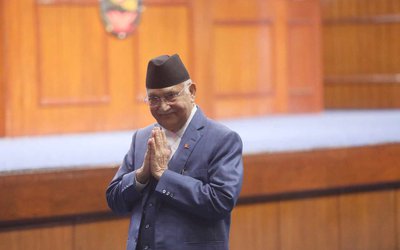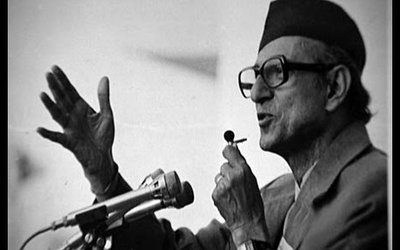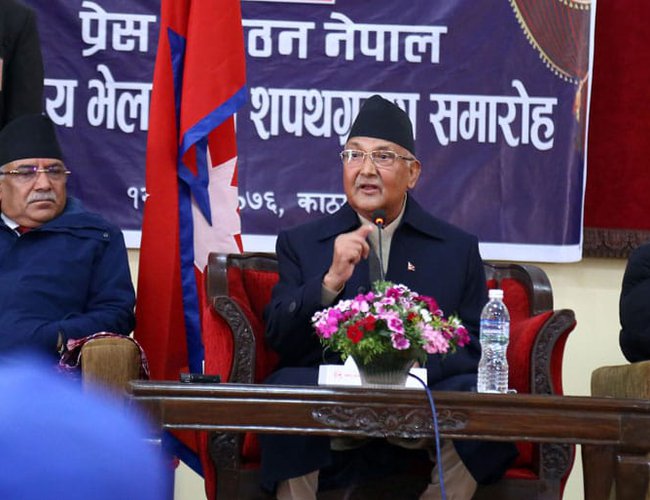
Although Prime Minister K.P Sharma Oli is claiming that his government will complete his full term in 2023, his lack of physical capacity and the current political development indicate that Nepal is fast moving in the direction of instability.
“Despite conspiracy by national and foreign forces, this government continues in power. We will expose such forces,” said PM Oli, accusing media reporting about his personal involvement in different scandals.
Three recent events have come to dominate the political landscape in Nepal. Internal feud in Nepali Congress, pull-out of Samajbadi Party from the government and new power-sharing deal between ailing Prime Minister Oli and co-chairman of the Nepal Communist Party (NCP) Pushpa Kamal Dahal.
Brokered by President Bidhya Devi Bhandari, a new deal paved the way to continue with Oli as prime minister till the termination of the present house and Dahal on a wait to replace Oli as an executive chair.
Despite PM Oli’s rejection of new deal claiming himself as executive chair and PM, Dahal has been quietly chairing all the meetings of the Party. With consent from PM Oli, co-chair Dahal has proposed the amendment of the Party’s constitution. This shows ruling Nepal Communist Party is now heading for new set up.
NC Internal Feud
Although several efforts have been made to patch up the differences in the party between president Sher Bahadur Deuba and Ram Chandra Poudel factions, there is no sign for any patch-up soon. The party is heading towards a point of split given former splinter like General Secretary Prakash Man Singh with Poudel camp and Bijaya Gachhadar with president Deuba.
With the announcement of date for general convention and elections for the party organization unilaterally, president Deuba has shown that the compromise has its limitation.
The rival faction of the Nepali Congress led by Paudel said that they will not accept the establishment faction’s decision to extend the tenure of the party’s leadership by one year.
A meeting of the NC’s Central Working Committee, which the Paudel faction boycotted, had decided on December 27 to extend the tenure of the current leadership by one year from 3 March 2020 when the tenure of office bearers would end.
NC CWC has prepared the calendar of events for the next national convention proposing to hold it from February 19 to 22 in 2021. Paudel said his faction wanted the party to hold its next national convention by mid-December next year, not beyond that.
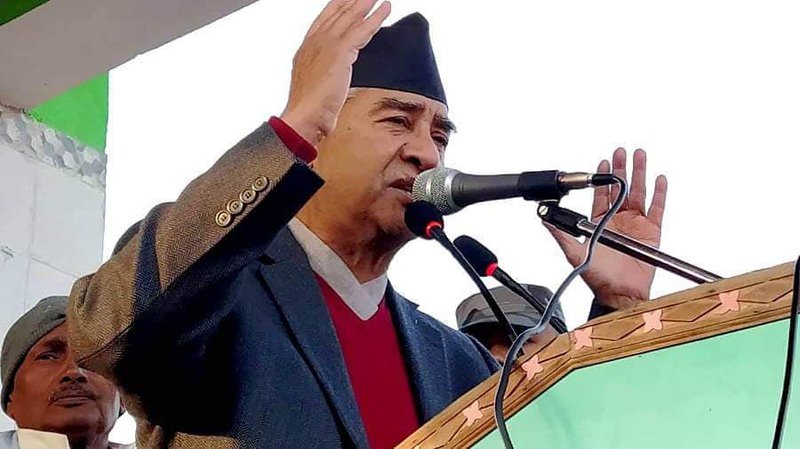
As Paudel has insisted on correcting the CWC’s decision, extending the tenure of party office bearers, president Deuba has flatly rejected. Paudel said his faction would consult all the cadres of the party and party wings on the next course of action disclosing future plan. Given the growing disputes, one cannot rule out the possibility of split in the party which has a history of several split in the past.
Withdrawal Of Support
Although co-chair of Sanghiya Samjabadi Party Upendra Yadav got stuck to the position even after a humiliating cabinet reshuffle, when he was transferred to new ministry and one of his ministers was removed without his consent, the mid-night agreement signed between its rival Rashtriya Janata Party Nepal and ruling NCP sharing the seats in forthcoming National Assembly Election changed the mind of Yadav.
A few days after the ruling NCP and RJP understanding, Yadav, who remained silent for almost two years, announced the constitution amendment proposal in he cabinet angering prime minister Oli who flatly rejected any move to amend the constitution. It paved the way for Yadav to pull out from the government.
The pullout of the Sanghiya Samajbadi Party from the government was another significant political development. “We have decided to pull out from the government because prime minister rejected to implement the agreement signed between us,” said DPM Yadav. Even after the pull out of Sanghiya Samajbadi Party led by Yadav, the government has absolute majority in the House of Representatives.
As Yadav was out, Prime Minister Oli is wooing another Madheh based Rashtriya Janata Party to join the government. Given the current political circumstances, it is not easy given the complexity involved in it.
On surface, the power struggle has been resolved to Oli’s advantage with the former prime minister Prachanda. PM Oli has positioned the Damocles’ sword over Dahal for war-time excesses, which is to be investigated by the Truth and Reconciliation Commission (TRC).
“Dahal’s confidante, Speaker KB Mahara, has landed in jail over an alleged case of rape. Grapevine suggests he was framed. Mahara has served as the Deputy Prime Minister three times and has been a Minister in every coalition Government, which Maoists had joined/formed. Prachanda is now an emperor without clothes whom Oli is able to bully as the junior but is an unyielding partner,” Nepal expert General Ashok Mehata writes in his article in Pioneer Daily.
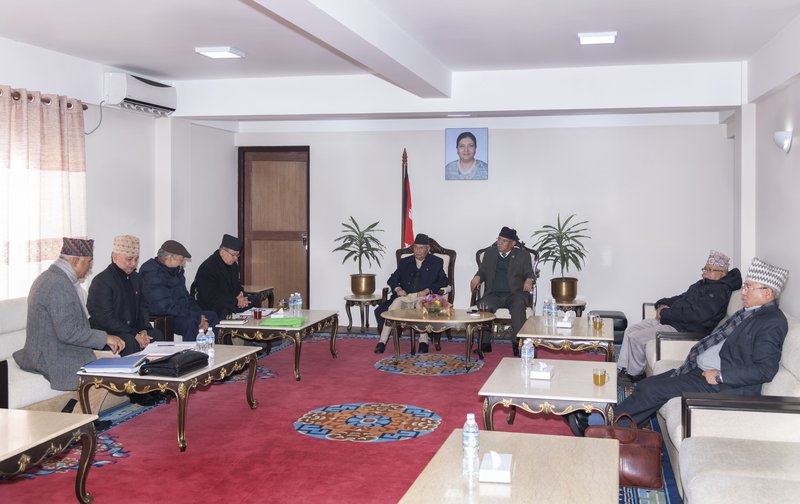
“Oli carried out the much-awaited Cabinet reshuffle, which turned out to be a storm in a teacup. Though new Ministers were inducted, three senior and three junior Ministers were dropped. The evergreen Madhesi leader, Upendra Yadav of the Samajwadi Party Nepal (SPN, which has changed names more frequently than change in seasons), whose portfolio was changed from health to law and justice while he was in New Delhi attending a conference, made some noises but quietly accepted the alteration,” writes Mehata.
With 17 seats in the House, Yadav’s party has many talented leaders, including former Prime Minister Baburam Bhattarai. This provides Oli the silver bullet of a two-third majority, with which, the Madhesis hope, he will alter the Constitution and meet their residual demands. India, too, has been pressing for the same for quite some time now. Prachanda is more amenable towards settling Madhesi grievances. The only real Madhesi party left is the Rastriya Janata Party (RJP), which in coalition with SPN and NCP, rules the only Madhesi Number 2 province.
Mehata On Internal Politics
Kathmandu may, therefore, have a Government completing its full term on March 18, 2023. Oli’s health, a cause of concern, is the only contingency when leadership change can occur, which can happen any time soon. The successor Prime Minister will surely emerge from the NCP. The lawmaker numbers are stacked in favour of the Oli faction (121) against Prachanda Maoists (53) in a House of 275 members. The NCP’s general convention has not been held, nor have the two parties amalgamated at the grass-root level.
As has happened before — though this time it’s less likely — Prachanda can jump ship if he is not offered the top job or at least the power-sharing deal is not revived for the remaining three years in case of leadership change. Crossing the rubicon and re-joining NC will take the House tally to 116 (NC 63 and Maoists 53). With obliging hands from RJP (17) and SPN (16), the coalition will reach 150 lawmakers, crossing the halfway mark of 138.
Oli fears Prachanda can dislodge him but he has said no power on earth can prevent the NCP from completing its full-term. Only Prachanda can change that. Oli’s physical ailment to be the Prime Minister will be the inflection point in Nepalese politics.
Given the new political development, it seems that the country is heading towards new political developments likely to turn the country from relative stability to instability.

Keshab Poudel
Poudel is the editor of New Spotlight Magazine.
- HELVETAS NEPAL’S RIVERBED FARMING: Shift From Overseas To Local Farming
- Jul 26, 2024
- POLITICAL SCENARIO : K.P. Sharma Oli's Resurgence
- Jul 21, 2024
- UNDP/MinErgy: An Inventive Approach To Clean Brick Kiln
- Jul 19, 2024
- HELVETAS NEPAL: Nutrition Through Riverbed Farming
- Jul 18, 2024
- NOU Opens To All: Dr. Shilu Manandhar Bajracharya, Vice Chancellor
- Jul 15, 2024

